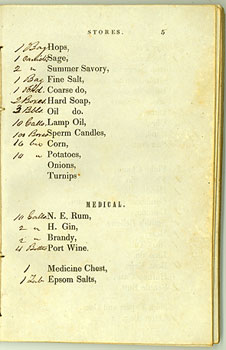Tobacco and Alcohol on Board, continued
Alcohol, on the other hand, had a more mixed reputation. In the early days of long whaling voyages, whiskey and rum were often part of standard provisions on some ships, distributed freely to the men in the form of "grog." Some captains would have in their store a variety of liquors and wines, mostly reserved for their own use in entertaining. Those whale ships captained by Quakers, on the other hand, never brought liquor other than for medicinal purposes. Since medical aid was the masters' responsibility, limejuice, brandy, gin and rum were kept in Captains' cabins for such needs.
During America's temperance decade, between 1830 and 1840, steps were made towards eliminating the tradition of offering alcohol to crew. When masters and owners came to realize how much discipline and efficiency of their men were affected, that practice began to change. Strong drink might still come on board occasionally, but it was no longer given out as freely. Inevitably, some crewmembers would smuggle alcohol that often led to trouble.

Martha's Vineyard Museum